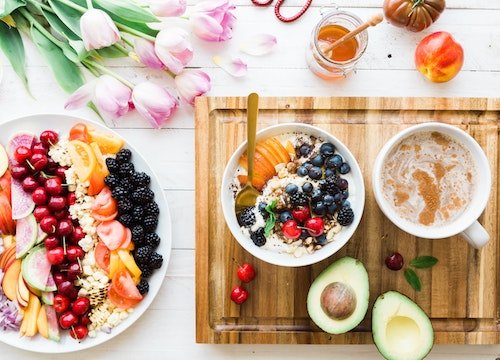Introduction
Nutrition and diet are two of the most important factors in maintaining a healthy lifestyle. The food we eat directly affects our physical and mental health, making it crucial to choose the right foods to fuel our bodies. However, with so much conflicting information and fad diets out there, it can be challenging to know where to start. This guide aims to provide you with the knowledge and tools you need to make informed choices about your nutrition and diet.
Understanding Macronutrients
Macronutrients are the three main components of our diet: carbohydrates, proteins, and fats. Each of these plays a vital role in providing energy and nutrients to our bodies.
Carbohydrates: Carbs are the primary source of energy for the body. They are found in foods like fruits, vegetables, grains, and dairy products. Simple carbs, like sugar and white bread, are broken down quickly by the body and provide a quick energy boost. Complex carbs, like whole grains and vegetables, take longer to break down and provide sustained energy.
Proteins: Proteins are essential for building and repairing tissues in the body. They are found in foods like meat, fish, eggs, beans, and nuts. Proteins are made up of amino acids, which are the building blocks of our cells.
Fats: Fats are an essential part of our diet, providing energy, insulation, and protection for our organs. They are found in foods like oils, nuts, seeds, and fatty fish. Unsaturated fats, like olive oil and avocado, are healthier than saturated and trans fats found in processed foods.
Micronutrients and the Importance of Vitamins and Minerals
Micronutrients are the smaller, but equally important, components of our diet. Vitamins and minerals play a critical role in maintaining overall health and preventing chronic disease.
Vitamins: Vitamins are organic compounds that the body needs in small amounts to function correctly. They are found in foods like fruits, vegetables, and whole grains. Each vitamin plays a unique role in the body, from promoting healthy vision to strengthening the immune system.
Minerals: Minerals are inorganic substances that are essential for various bodily functions. They are found in foods like leafy greens, nuts, and seeds. Minerals are involved in everything from bone health to nerve function.
Meal Planning and Portion Control
One of the keys to a healthy diet is proper meal planning and portion control. Here are some tips to help you stay on track:
Plan your meals in advance: Planning your meals ahead of time can help you stay on track and avoid making unhealthy choices.
Use smaller plates: Using smaller plates can help you control your portion sizes and avoid overeating.
Focus on whole foods: Whole foods, like fruits, vegetables, and whole grains, are nutrient-dense and can help you feel fuller for longer.
Debunking Common Nutrition Myths
There are many myths and misconceptions surrounding nutrition and diet. Here are some of the most common ones debunked:
Myth: Carbs are bad for you: Carbs are an essential part of a healthy diet and provide the body with energy. However, not all carbs are created equal. Choose complex carbs, like whole grains and vegetables, over simple carbs like sugar and white bread.
Myth: Fat makes you fat: While eating too much fat can contribute to weight
Myth: All calories are created equal: While the number of calories you consume does play a role in weight management, not all calories are created equal. The quality of the food you eat is just as important as the quantity.
Myth: You need to eat meat to get enough protein: While meat is a good source of protein, there are plenty of plant-based sources of protein as well, like beans, nuts, and tofu.
Myth: Skipping meals will help you lose weight: Skipping meals can actually lead to overeating later in the day and may cause your metabolism to slow down, making it harder to lose weight.
FAQs
Q: How much protein do I need per day? A: The amount of protein you need per day depends on factors like your age, sex, and activity level. A general guideline is to aim for 0.8 grams of protein per kilogram of body weight.
Q: Can I still enjoy my favorite foods and maintain a healthy diet? A: Yes! The key is moderation and balance. You can still enjoy your favorite foods in moderation as part of a healthy, balanced diet.
Q: Are supplements necessary for good nutrition? A: Supplements can be helpful for filling in nutrient gaps, but they should not replace a healthy diet. It’s always best to get your nutrients from whole foods whenever possible.
Conclusion
Nutrition and diet are fundamental components of a healthy lifestyle. By understanding the basics of macronutrients, micronutrients, meal planning, and portion control, you can make informed choices about what you eat and improve your overall health. Remember to focus on whole, nutrient-dense foods, and don’t be afraid to enjoy your favorite treats in moderation. With the right knowledge and tools, you can achieve a healthy, balanced diet and feel your best.
